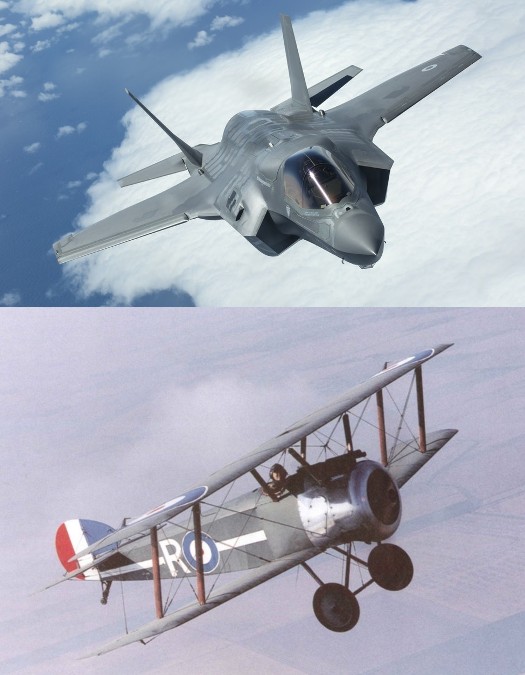 The recent murder of Mr Khashoggi at the hands of the Saudi regime (https://www.bbc.co.uk/news/world-middle-east-45935823) brings into sharp focus the Faustian pact that the UK has made insofar as it’s arms industry is concerned.
The recent murder of Mr Khashoggi at the hands of the Saudi regime (https://www.bbc.co.uk/news/world-middle-east-45935823) brings into sharp focus the Faustian pact that the UK has made insofar as it’s arms industry is concerned.
The above two photographs demonstrate a particular point. The topmost aircraft is the Lockheed Martin F-35 Lightening II. It is one of the most expensive military projects in the history of the planet. The bottom aircraft is the Sopwith Camel. Both are single pilot, single engine fixed wing heavier than air aeroplanes.
They cost vastly different amounts of money to develop. Curiously, both aircraft are difficult to fly and as a result extremely manoeuvrable. The Camel owed both its extreme manoeuvrability and its difficult handling to the close placement of the engine, pilot, guns and fuel tank (some 90% of the aircraft’s weight) within the front seven feet of the aircraft, and to the strong gyroscopic effect of the rotating mass of the cylinders common to rotary engines. Aviation author Robert Jackson notes that: “in the hands of a novice it displayed vicious characteristics that could make it a killer; but under the firm touch of a skilled pilot, who knew how to turn its vices to his own advantage, it was one of the most superb fighting machines ever built”.
The F-35 is difficult to fly because of it’s shape – required to reduce radar reflections – and is unstable and as a result extremely manoeuvrable. So complex are it’s flying characteristics they have to be controlled by a computer that is in fact an example of AI (artificial intelligence).
The problem with projects like the F-35 is that large numbers need to be produced to defray the development costs. Such is the cost of the F-35 programme that even the USA with it’s vast military budget is strained. Smaller countries such as the UK with their own arms industries are in a far worse position.
This is why export sales of arms is so important – they help reduce the costs to the UK armed services. They also produce job’s, profits and therefore taxes. The trouble is that many of those countries in the world who do not have arms industries have atrocious regimes.
It would be very easy for a government minister to stand up at the dispatch box in the Commons and denounce the Saudi regime and announce that the UK would no longer sell any arms to Saudi Arabia.
That would cost jobs and loose tax revenue.
The long term solution to this invidious problem is to transform the UK arms industry into a civilian industry producing hi-tech goods that do not kill and maim people. Of course, the UK armed forces will still need military equipment. We should buy such from overseas. Only then will we rid ourselves of this awful problem.
NB: Before some readers become holier than thou and start criticising those awful Saudis, let us not forget that the murderous activities of the Saudis and the Russians were matched by our rulers centuries ago. Queen Elizabeth I regularly sent assassins overseas to murder those she saw as a threat living in exile abroad.
Speaking the Truth unto the Nation
